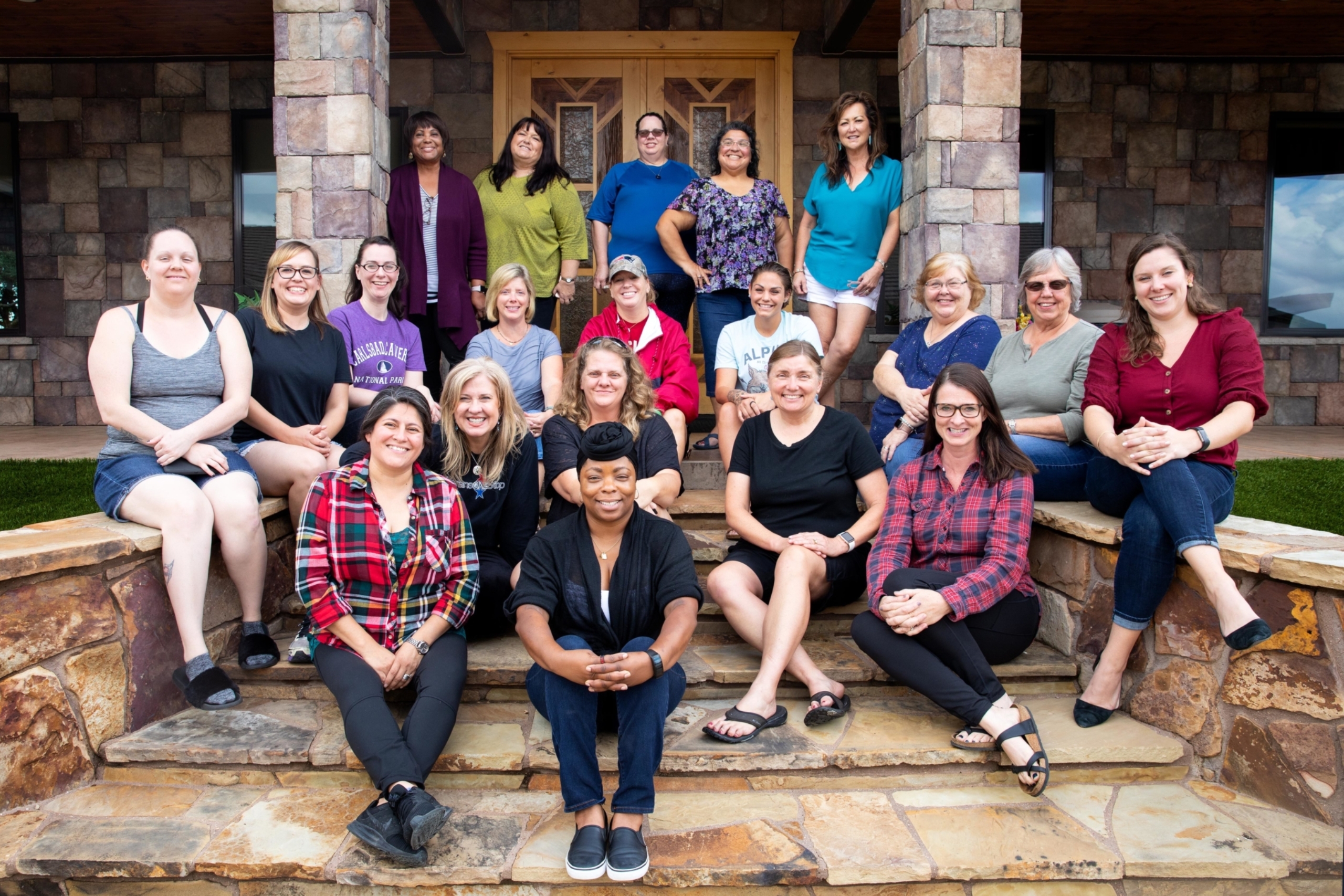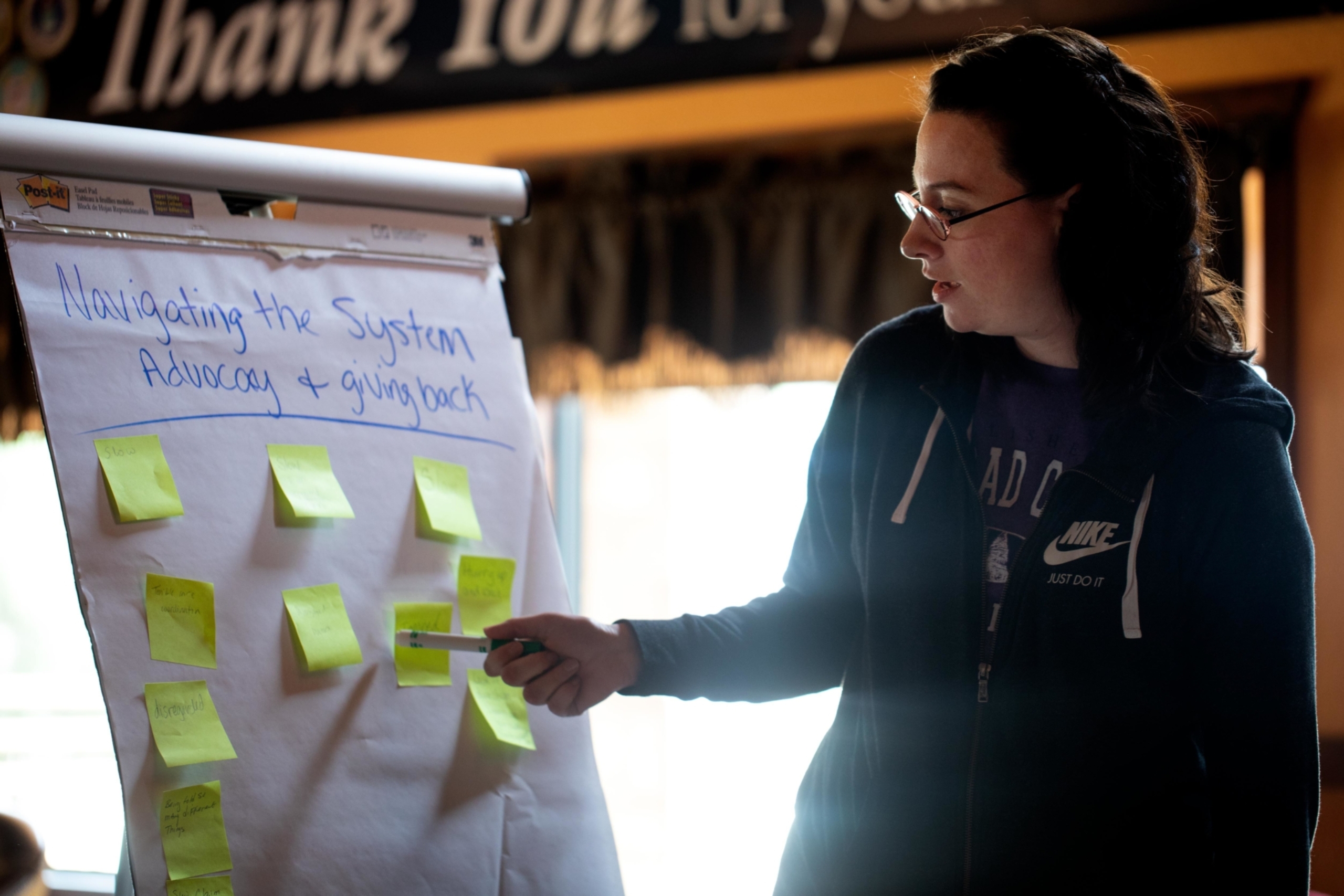UT Austin’s Institute for Military and Veteran Family Wellness, a joint effort by Dell Med and the Steve Hicks School of Social Work, has launched a pilot intervention to help foster resilience and improve quality of life for the spouses of active-duty military service members, who experience an immense range of social and emotional support needs while their partners are serving our country.

Peer leaders gather during a Veteran Spouse Resiliency Group leader training. Photo Credit: Montinique Monroe
AUSTIN, Texas – For 41-year-old mother of four Melissa Megoulloa, taking on the challenges as the spouse of an Army sergeant was familiar territory, dating back to her childhood.
“I’m a Navy brat. I saw what a hard time my mother had when we were kids. I swore if I married a military man, I’d make sure no one goes through what we did,” said Megoulloa. “Every [military] base I’ve moved to, I’ve asked, ‘How can we do this better?’”
The nation’s more than 700,000 spouses of active-duty military personnel like Megoulloa face myriad practical and emotionally taxing obstacles in supporting their partners. As part of its multifaceted work to address the social support and behavioral health needs of military and veteran families, the Institute for Military and Veteran Family Wellness at The University of Texas at Austin is launching a new research initiative focused on supporting military spouses. The institute is a joint effort of Dell Medical School’s Department of Health Social Work and the Steve Hicks School of Social Work.
Supported by a $1.4 million award from the Congressionally Directed Medical Research Program (CDMRP), the UT team will adapt and test an existing curriculum-based peer support group model called the Military Spouse Resiliency Group Program. The program trains military spouses to become peer leaders who facilitate supportive discussions with other active-duty spouses and connects participants to local and national support resources.
The Unique Challenges of Military Spouses
Frequent relocation to brand new surroundings has placed the Megoulloa household of six in constant upheaval. For the past twenty years, her husband has been moved through his job in active military service every 18 months to three years. When he gets a new assignment, all his arrangements are given with detailed instructions from the Army. In contrast, spouses often don’t receive any guidance, said Megoulloa.
“The families are expected to just figure it out. Things like, how do we get to the new location? Can I find a job? How will I set up play dates for my kids? We have to create a whole new support system for ourselves to survive.”
A recent study indicated that nearly a quarter (24%) of active-duty family members say that “military family quality of life” is a top concern, pointing to instability and inconsistency of daily life as the key reason. Spending enough time with children and family, the frequency and difficulty of relocating, and limited communication from the military command are common issues cited.
Initial results from the current study show that participants of the peer support group model experience improvements in quality of life, depression and anxiety, self-care behaviors and perceived social support.
“The ultimate goal is to improve spouses’ sense of social and community support, self-care practices, mental health and quality of life,” said study principal investigator Elisa Borah, director of the institute and research associate professor at the Steve Hicks School of Social Work. “This research will examine the extent to which group-based peer support led by trained, peer military spouse leaders gets us closer to that goal.”
“In addition to extended separation, numerous moves, single parenting, relationship strains and challenges in caring for their spouse’s health concerns, military spouses may also struggle to establish careers or finish educational degrees due to the unpredictable nature of military life,” said Borah, whose research is focused on developing, testing and effectively implementing mental health treatments and social supports for military-connected adults.

Peer leader Pamela Garza presents a training for the Veteran Spouse Resiliency Group. Photo Credit: Montinique Monroe.
Potential to Scale Across the Armed Forces
This year, UT’s new three-year study will begin recruiting Army spouse participants at Fort Hood, Texas – the largest active-duty armed post in the U.S. Armed Forces – with the goal to support 150 spouses. If this group support intervention proves effective, Borah expects to scale the model across other Army locations, with the potential to affect the lives of many thousands of spouses.
“Being a part of a program like this helps you create an instant family,” said Megoulloa. You’ve got people telling you what to be careful about and how to prepare in a new place where you don’t even know what you need to be worried about.”
The Military Spouse Resiliency Group Program was adapted from the Veteran Spouse Resiliency Group, a support model operating within the university’s Veteran Spouse Network. The newer program is tailored specifically to active-duty spouses, whose experiences during and after military life can be vastly different.
As part of Dell Med and the Steve Hicks School of Social Work, the Institute for Military and Veteran Family Wellness serves as a hub for researchers and community members to work together to develop programs and practices needed by service members, veterans and their family members. The institute partners with local and national providers, researchers, and military and veteran community members who are committed to ensuring that military communities have access to effective care for their mental health and community-based needs.
The Congressionally Directed Medical Research Program (CDMRP) strives to transform health care for military service members and the American public through innovative and impactful research. Programs managed by the CDMRP share the common goal of advancing paradigm shifting research, solutions that will lead to cures or improvements in patient care, or breakthrough technologies and resources for clinical benefit.